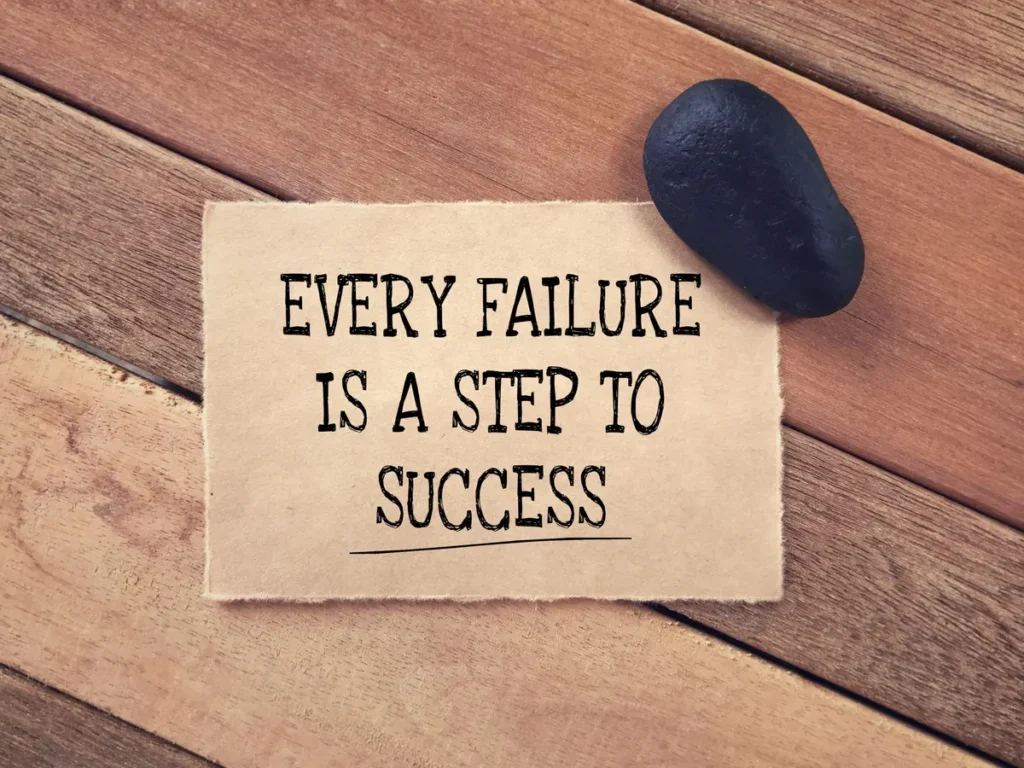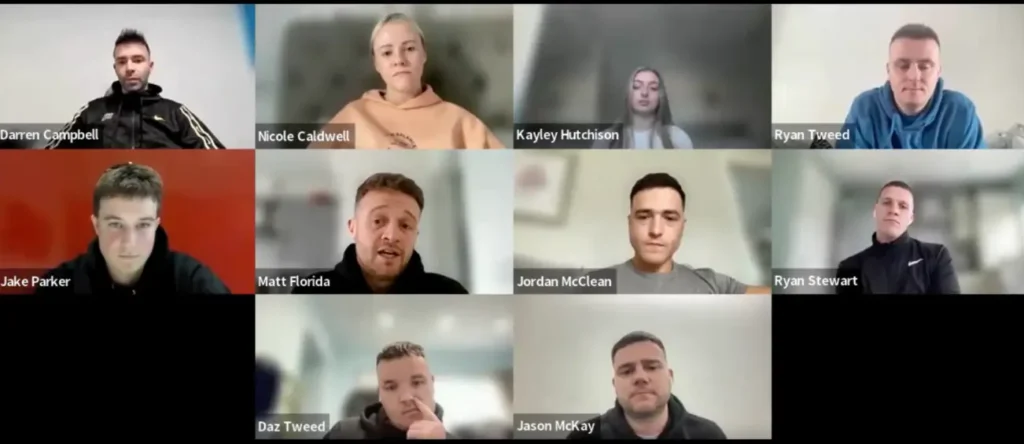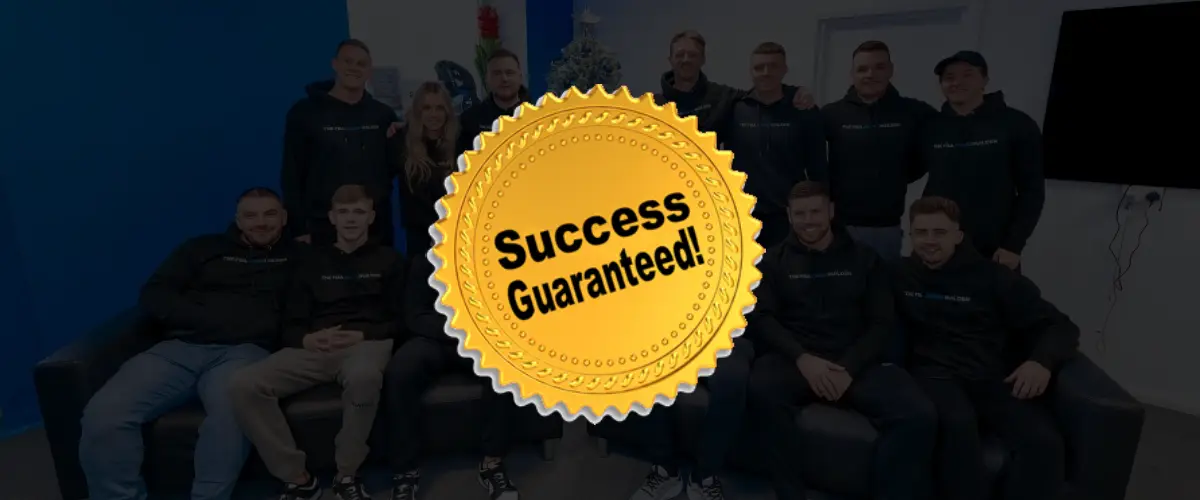Darren Campbell’s FBA Brand Builder program comes across as a game-changer for aspiring entrepreneurs itching to break free from the typical 9-to-5 routine. The big promise? Not just success—guaranteed success.
That kind of claim really ups the stakes, nudging people toward financial decisions they might not normally consider. When you dig into the program’s materials and listen to what Darren and his team have to say, it becomes pretty clear how their messaging can push participants to stretch themselves way too thin financially.
Part 1: The "No-Fail" Mindset
A recurring theme in the program is the assertion that success is inevitable, as long as participants remain committed. While persistence is a valuable trait in entrepreneurship, Darren’s messaging takes it to an extreme, creating a false sense of security for participants.
Key Quotes:
- "There’s absolutely no excuse for you to fail. The only way you fail here is if you give up."
(Stage 1 of the program)
This statement outright dismisses external challenges, such as market dynamics or personal financial limitations, painting failure as a character flaw rather than a risk inherent to any business venture. - "The blueprint is going to make sure you’re successful. You’re launching this product no matter what."
(Stage 4 of the program)
The phrase "no matter what" adds to the pressure, suggesting that launching a product—even when the participant might feel financially unprepared—is the only path forward. - "If you don’t give up, you cannot lose."
(Stage 8 of the program)
This reductionist view of entrepreneurship negates the realities of financial limitations, competitive markets, and unpredictable consumer behavior.
Further Reading: The Reality of Amazon FBA: What Darren Campbell's Emails Don't Tell You.
This article contrasts the promise of easy success with the realities of Amazon FBA.

Part 2: Pushing Financial Overcommitment
Many participants report being encouraged to take financial risks that, under normal circumstances, they would avoid. The program normalizes leveraging credit, loans, and other high-risk financial instruments by tying them to the promise of inevitable success.
Key Quotes:
- "If this fucking idiot here can do 178K in 30 days, there’s nothing stopping you guys from doing it."
(2024 Weekly Calls)
Darren’s self-deprecating humor minimizes the effort and expertise required to achieve such results, implying anyone can replicate this success. - "Think of this as an investment in yourself. Whatever it takes to launch your brand, you’ll thank yourself when you hit 10K a month."
(Stage 8 of the program)
Framing financial risks as self-investment can lead participants to justify taking on unsustainable debt. - "Loans, credit cards—whatever it takes to get that first product out there."
(Darren’s social media posts)
The direct endorsement of using loans and credit cards as viable strategies ignores the long-term financial burden they create. - "If you’ve got a product you believe in, you’ll make it back tenfold. There’s no way to lose with the right mindset."
(Stage 4 of the program)
Overemphasizing belief and mindset trivializes the importance of practical considerations like cash flow and market validation.
Further Reading: Financial Strain and Unanticipated Costs in FBA Brand Builder: What Clients Should Know.
This piece highlights how clients are encouraged to take on debt and face ongoing financial pressures.

Part 3: Inflated Expectations and Misleading Metrics
Darren’s program frequently relies on exaggerated examples of success to create aspirational goals. These examples lack the critical context needed to evaluate their feasibility, leaving participants with unrealistic expectations.
Key Quotes:
- "There’s a product that sells, GoSports does about nearly $2 million a month in revenue, because they sell for $119."
(2024 Weekly Calls)
While impressive, this example omits the scale, resources, and competitive edge required to reach such revenue levels. - "You want to launch this product, you know it’s going to work."
(Stage 4 of the program)
This definitive statement assumes market success without addressing the nuanced risks of product launches. - "You’ll launch this product at exactly the time you’re supposed to. Trust the process."
(Stage 3 of the program)
Encouraging blind trust in the program undermines the importance of due diligence and critical thinking.
Further Reading: Promises vs. Reality: The Limited Value of FBA Brand Builder Training and Resources.
This article explores exaggerated claims and the gap between marketing promises and actual outcomes.

Part 4: Emotional Appeals and Community Pressure
The program fosters a sense of belonging and emotional commitment through its “family” rhetoric. While this can be motivational, it can also discourage participants from questioning the program’s advice or considering exit strategies.
Key Quotes:
- "You’re now officially part of the FBA Brand Builder family… The community is so, so strong."
(Stage 1 of the program)
By positioning the program as a family, it subtly discourages dissent and fosters emotional dependency. - "You’re now at a frequency with other people who think like you."
(Darren’s social media posts)
The language of exclusivity creates a pressure to conform and justify financial risks as part of the “shared vision.”
Further Reading: The Emotional Cost of FBA Brand Builder Failures.
This piece focuses on the psychological and emotional toll of the program's high-pressure environment.

Part 5: The Emotional Toll of Chasing “Guaranteed Success”
The psychological impact of the program’s messaging can be as significant as the financial toll. By equating failure with personal weakness or lack of determination, the program fosters feelings of guilt and inadequacy in participants who don’t achieve the promised results.
Key Quotes:
- "If you don’t make it, it’s because you gave up."
(Stage 1 of the program)
This kind of messaging blames participants rather than acknowledging the systemic challenges of entrepreneurship. - "Think of all the hurdles, think of all the pain, think of all the suffering... You’ve made it this far, so don’t let yourself stop now."
(Stage 7 of the program)
While this might seem motivational, it creates a sunk-cost fallacy, encouraging participants to invest more time and money to avoid feeling like they’ve wasted their efforts.
Analysis:
This approach discourages participants from reassessing their position, pivoting strategies, or stepping back to minimize losses. Instead, they are pushed deeper into a cycle of emotional and financial strain.
Further Reading: The Psychology of Fear: How FBA Brand Builder Exploits Your Dreams and Doubts.
Discusses how emotional manipulation is used to keep clients invested despite growing challenges.

Part 6: Lack of Transparency About Failure Rates
One glaring omission in the program is an honest discussion about failure rates among Amazon FBA sellers. By selectively highlighting success stories, the program avoids acknowledging the broader realities of the marketplace.
Key Quotes:
- "We’ve perfected this system to eliminate all risk for you."
(Paraphrased from program materials)
Such claims dismiss the inherent risks of running a business, from supply chain disruptions to market saturation. - "Look at Josh’s product; he’s going to absolutely crush this market."
(2023 Weekly Calls)
While success stories like Josh’s are heavily promoted, there’s little mention of participants who followed the same blueprint but didn’t achieve similar results.
Analysis:
An honest discussion of risks would empower participants to make informed decisions. Instead, the program creates a one-sided narrative that sets unrealistic expectations.
Further Reading: Transparency and Accountability in the FBA Brand Builder Program: What's Missing?.
Addresses the lack of openness about failure rates and client outcomes.

Part 7: Questions Potential Participants Should Ask
To empower readers, this section can include a list of critical questions to ask before committing to any FBA program, including Darren Campbell’s. Examples:
- What is the program’s actual success rate, and how is it calculated?
- Are there any hidden costs (e.g., for tools, additional coaching, or advertising)?
- How does the program support participants who encounter setbacks or fail to achieve profitability?
- Can I access a refund if the program doesn’t meet my expectations?
This section shifts the focus to actionable advice, helping readers avoid making impulsive or ill-informed financial commitments.
Further Reading: Inside the FBA Brand Builder Contract: What You Need to Know Before Signing.
Provides practical advice on what to ask and understand before joining a high-ticket FBA program.

Part 8: Spotlight on the "All-Star Team"
The program heavily markets its "all-star team" of mentors, but participants have reported mixed experiences. This section could investigate the actual qualifications and expertise of the support staff, contrasting it with the promises made in marketing materials.
Key Quotes:
- "Before you dive in, I want to introduce you to my all-star team... They’re here to help you every step of the way."
(Stage 1 of the program) - "Jason’s got more experience than anybody when it comes to placing an order and dealing with your trademark."
(Stage 6 of the program)
Analysis:
While the team may be knowledgeable (to a certain extent), the lack of transparency about their individual credentials raises questions about their ability to provide expert guidance on complex issues like product research, sourcing, and marketing.
Further Reading: Who’s Really Running Your Ads? The Big Gaps in Darren Campbell’s FBA Brand Builder Program.
This article questions the expertise of the program’s mentors and staff.

The Cost of Chasing Promises: Making Smarter Choices
The promise of guaranteed success can be hard to resist, especially when paired with dreams of financial freedom and life-changing opportunities. Darren Campbell’s FBA Brand Builder program highlights the dangers of leaning into overly optimistic claims without careful examination. With its inflated promises, emotional marketing tactics, and a troubling acceptance of financial overextension, it serves as a cautionary example for anyone eyeing an expensive Amazon FBA course.
Instead of getting swept up in the hype, it’s crucial to demand honesty and clarity. Ask tough questions, dig into real-world outcomes, and take a hard look at the financial investment before diving in. Success in entrepreneurship isn’t handed out through a one-size-fits-all system—it takes sharp thinking, practical planning, and the courage to navigate inevitable uncertainties.
Building a successful Amazon business is achievable but far from guaranteed. The key is to prioritize programs that focus on solid education, calculated risk-taking, and tangible results over flashy promises. Your future deserves better than wishful thinking—make choices that are informed, grounded, and truly set you up for success.

